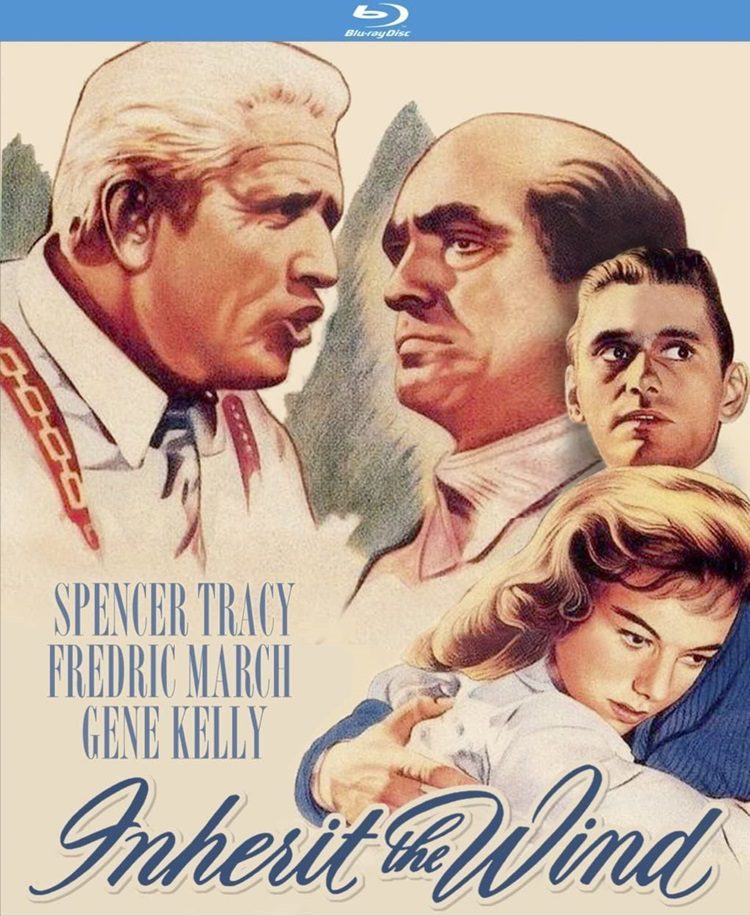
I grew up in rural Oklahoma. I attended a conservative evangelical church. I can remember preachers and teachers railing about the evils of evolution from the pulpit and in the classroom. I can remember silently freaking out in 7th grade science when the teacher would talk about evolution and feeling the utmost guilt when I answered test questions that went against my belief. It wasn’t until college, or if I’m being honest years after college, that I began to actually read the science of evolution. Removed from the anti-science rhetoric of my church, it actually made sense. I discovered that there are many Christians who have a strong faith yet believe in the science. Hell, the Catholic Church officially accepts evolution as a fact.
Buy Inherit the Wind Blu-rayWatching Stanley Kramer’s 1960 film Inherit the Wind was a bit like watching my former self debate the issue with my current-day self, but with a better script, better direction and a lot more yelling. The film is based upon the stage play of the same name, which itself is a fictionalized retelling of the famous Scopes Monkey Trial from 1925. The state of Tennessee had just outlawed the teaching of evolution in public schools and when John Scopes proceeded to break that lawm they arrested him and put him on trial. The famed defense attorney Clarence Darrow took up for Scopes while former congressman, Secretary of State, and three-time presidential nominee William Jennings Bryan prosecuted the case. The trial became a national sensation, being reported widely in newspapers all over the country. Famed journalist H.L. Menecken made his named reporting on the case. Scopes lost the trial and was fined $100. Several states quickly created anti-evolution laws of their own, but public opinion on the matter began to turn and now the case is seen as a victory for science.
In the film, Spencer Tracy takes the Darrow role (here called Henry Drummond), Frederic March becomes Bryan (here called Matthew Harrison Brady) and Gene Kelly plays Mencken (here dubbed E.K. Hornbeck). Outside the courtroom, the film is mostly fiction with some side characters invented and a romance given to the Scopes character (here called Bertram Cates, played by Dick York), but inside, it plays things pretty much as they actually occurred (with some literary license by way of juicy monologues thrown in).
Drummond and Brady give grand speeches, throw shade towards one another, and snipe back and forth for much of the film. There is a lot of grandstanding and shouting going on from both sides. The writing is good and the acting is fantastic. As a showcase of Spencer Tracy and Frederic March’s acting chops, this film is exquisite. Tracy plays Drummond as an intelligent, passionate man who is tired of fanatics trying to tell people how to think. March plays Brady with no less passion than Drummond but with a deep concern for people’s souls. He sees Drummond as an agnostic bound to Hell and he wants to keep the devil’s teachings out of the classroom. Kramer’s direction is tightly controlled. Most of the film is set inside the courtroom so there isn’t a lot of movement the camera can make, but it’s beautifully shot and he still manages some interesting images.
As a piece of filmmaking, I like this movie very much. It’s the message that I find tiresome. The film is squarely on the side of Drummond and science. He gets the best lines and is the more sympathetic of the two leads. He can be rascally and angry, but he’s always sympathetic. Whereas Brady sometimes slips into caricature, he’s a fanatic more concerned with scoring points with his audience than finding truth or justice. The townspeople are all his followers and lift him up like a saint. They sneer at Drummond and at one point they form a parade where they sing “We’ll hang Burt Cates (or Henry Drummond) to a sour apple tree” to the tune of The Battle Hymn of the Republic. Gene Kelly plays Hornbeck as a sarcastic wiseacre who very much wants Drumond to win the case, but ultimately is just interested in selling more newspapers.
It often felt like a modern article against Donald Trump from a site like the Huffington Post. I may agree with what it’s saying but it says it in such a one-sided, angry, and loud way, I wonder what they are trying to prove. As noted in my intro, I grew up in an young Earth evangelical community being taught about the evils of evolution. Now I spend time amongst those who agree with science and want to rail against the young Earth folks. I’ve heard the debates ad infinitum, so to get them in a movie no matter how well written and acted is still rather tiresome.
I do wonder what my younger self would have thought of this film. Would I have been convinced by its arguments? Probably not. I would have still probably enjoyed the film, but I know a great many believers who would walk out. It would be interesting to see how this movie played in 1960 when more of the country was still squarely against evolution. Plenty of people still view the world that way. Which I suppose goes to show how a film like this remains relevant.
Kino Lorber did not provide any information on this transfer. It looks good and I didn’t notice any debris, or other signs of deterioration. Extras include an audio commentary by film historian Jim Hemphill and the original trailer.
Though made in 1960 and based upon a trial that took place in 1925, Inherit the Wind‘s debate between science and religion remains quite relevant. It is beautifully directed and wonderfully acted. It veers a little too heavily into sanctimonious preacher mode for my tastes, but it’s well worth watching.